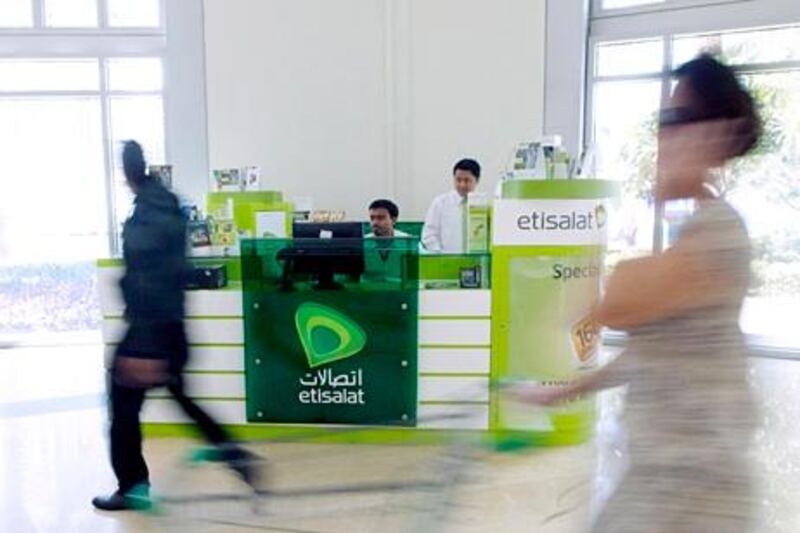Telecoms operators pay royalties to the Government, with Etisalat paying half of net profit. But the annual charges vary for du, whose share was recently raised. Ben Flanagan reports.
The UAE telecommunications market is one of the richest in the world but is also one of uncertainty for investors.
Shareholders in the operator du were spooked this month by the decision by the federal Government to slap a 5 per cent tax on its revenues from last year.
Both du and the incumbent operator Etisalat pay an annual royalty to the Government.
For Etisalat, the charge is 50 per cent of its net profit, for which the operator makes provisions in its annual results.
But for the newcomer du, which launched commercial services in 2007, the royalty rate varies.
In a market where the average consumer has two mobile phones, the local telecoms industry offers rich pickings for investors.
But analysts say the practice of setting the royalty rate for du retroactively causes uncertainty in the market.
In 2010, du was obliged to pay 15 per cent of its net profit to the Government - well below the rate paid by Etisalat.
But for last year, the royalty rate for du was set at 15 per cent of its profit, plus an additional 5 per cent of revenue- which was equivalent to almost 40 per cent of its net profit.
News of the increased royalty rate prompted a sell-off of du shares, which are traded on the Dubai Financial Market.
The company's share price fell by 2.3 per cent - its biggest decline in six weeks - when the announcement was made on February 6.
Matthew Reed, a senior analyst at Informa Telecoms & Media,says the fact that the royalty rate is set retroactively is unsettling for shareholders.
"It creates uncertainty for investors. And that might be off-putting for them," says Mr Reed.
Investors in du were not technically out of pocket because of the increase in royalty fees.
Du makes a provision for the government royalty on its balance sheet, setting aside 50 per cent of its net profit. For the first nine months of last year, du provisioned for Dh657 million (US$178.8m) for the royalty.
Under the royalty rate set by the Government, it will have to pay Dh519m for the first nine months of last year.
Despite this being below what du provisioned for, and less than what its competitor Etisalat pays, investors still reacted negatively.
"Perhaps the investors were hoping that it would stay at the 15 per cent," said Mr Reed. "[The government is] increasing the take quite substantially."
Ibrahim Masood, a director and senior investment officer for asset management at Mashreq, agrees that setting the royalty rate retroactively is "confusing" for shareholders.
He argues that the UAE federal Government should set the royalty rate for local telecoms operators in advance so that investors know where they stand.
"It just makes the investment case that much more certain," he says. "I think the more simplicity and clarity, the better."
Petr Molik, the head of the research division at the financial services group MENA CORP in Abu Dhabi, also says that setting the royalty rate in advance would add clarity for shareholders.
But he says the problem is mitigated by the fact that du made "prudent" provisions for the charge.
"The market would like to be clear in advance what the tax rate will be," says Mr Molik. "It would be good for the market, and for the shareholders, and even for the management to know in advance. It is mitigated by the fact that the management is very prudent, and when the real rate is announced, usually it's a good surprise."
Mr Reed argues that while setting the royalty fee in advance would provide more clarity, the current model gives the Government more flexibility.
"They're imposing these things retrospectively, so presumably the Government has already been able to observe the company during a large part of the year, and tailor what they are going to levy based partly on the performance," he says.
However the royalties are calculated, analysts expect the Government to continue to charge the UAE's two telecoms operators hefty fees.
In other Gulf markets - such as Saudi Arabia, Oman and Qatar - there is a history of governments lowering royalty payments when competition in the local telecoms market increases.
That has not happened in the UAE - and analysts do not expect a reduction in royalty fees anytime soon.
"You're still operating in one of the richest telecommunications markets in the world. And that's what you're paying a royalty for," says Mr Masood. "The argument is pretty strong for the overall royalty to remain significant."
* * *
Yesterday, Etisalat's board proposed a dividend of 60 fils for last year, as well as having discussed an efficiency drive.
The board “discussed the reduction and control of operating expenditures by initiating restructuring and outsourcing plans as a future strategy”, according to a statement issued by the telecoms operator.
That came after it made a net profit of Dh5.8 billion (US$1.57bn) last year, a 24 per cent decline on the year before.





